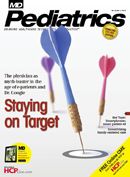Publication
Article
Health Reform: Incentivizing Family-centered Care
A roundup of recent news and announcements about the Affordable Care Act that focus on coverage and reimbursement issues that affect pediatricians
A roundup of recent news and announcements about the Affordable Care Act that focus on coverage and reimbursement issues that affect pediatricians.
ACOs and Postpartum Screening
In a post that appeared on February 3, the authors of the Health Reform Watch blog examined reimbursement issues involved in screening new mothers for postpartum depression during the one-, two-, four- and six-month well baby visits, as recommended by the American Academy of Pediatrics in 2010 (http://HCP.LV/g45Mah).
Although most pediatricians believe that screening for postpartum depression is within the scope of pediatric practice, there are some questions in terms of reimbursement. Postpartum screening itself isn’t the issue, as it takes little time and can be integrated into a reimbursable well visit; however, when a potential problem is identified, there are barriers, as pediatricians are not qualified to treat postpartum depression and should therefore refer these patients, said the AAP.
This, according to Health Watch Blog, is where accountable care organizations (ACOs) come in. “Just as Section 3022 of the Patient Protection and Affordable Care Act allows adult medical providers to form ACOs for the purpose of receiving incentive payments tied to savings to Medicare, under Section 2706 states can allow pediatric medical providers to form ACOs to receive payments tied to savings to Medicaid,” they wrote. Postpartum depression is just one condition that calls for care coordination, “not just on the patient’s behalf but also on the patient’s family’s behalf—and pediatric ACOs should be structured with this in mind.” http://HCP.LV/gE91ES
Keeping Students Covered
A proposed regulation announced by the Department of Health and Human Services (HHS) would ensure that students enrolled in health insurance coverage through their college or university benefit from critical consumer protections created by the Affordable Care Act.
According to HHS, approximately 1,500-2,000 institutions of higher education across the country offer some type of health coverage; however, there are significant discrepancies in terms of which benefits are covered by these plans and how they are regulated. The proposed regulation would ensure that students enrolled in these plans benefit from consumer protections created by the Affordable Care Act by clarifying that these plans will be defined as “individual health insurance coverage.”
Under the proposed rules, some of the new health insurance protections include:
• No lifetime limits on coverage
• No arbitrary rescissions of insurance coverage
• No pre-existing condition exclusions for students under the age of 19
The proposed rule would also place annual dollar limits on student health insurance plans of no less than $100,000 for policy years beginning before September 23, 2012. Health plans with policy years beginning after that date must fully comply with the Affordable Care Act’s annual limit restrictions.
The proposed rules would also require insurance companies to clearly inform those enrolled in student health plans whether their plan meets the new requirements. http://HCP.LV/eQTsk4
Putting Payment Bundling to the Test
As part of the overall goal to reduce health care spending without sacrificing quality, a provision of the Affordable Care Act aims to test a new payment strategy by creating integrated care delivery systems that include physicians, hospitals, and other health care service providers.
The pilot will provide one single payment for an episode of care, which will then be distributed to all the individual providers of services and goods that were involved in that episode of care, according to the American Academy of Family Physicians (AAFP).The payment bundling pilot program will be established no later than January 1, 2013, and will run for five years. No later than January 1, 2016, the HHS secretary will submit a plan to implement an expansion of the pilot program if doing so will reduce spending and improve the quality of patient care.
According to AAFP, the provision will apply to individuals who are entitled to Medicare Part A benefits and enrolled in Part B. In addition, the beneficiary must be admitted to a hospital for what is deemed by HHS to be an applicable condition.
Although many of the rules and regulations guiding implementation of the pilot program have yet to be written, the basic tenets of the program are laid out in the legislation.
